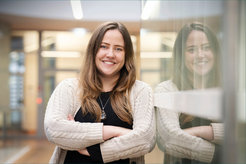Acknowledgement and support
Ina Huppertz is a new scholarship holder in the Young Academy of the „Nordrhein-Westfälische Akademie der Wissenschaften und der Künste“
On 1 January 2024, the “Nordrhein-Westfälische Akademie der Wissenschaften und der Künste” (North Rhine-Westphalian Academy of Sciences, Humanities and the Arts) will welcome 19 new fellows to the Young Academy - more than ever before. Ina Huppertz, research group leader at the Max Planck Institute for Biology of Ageing and the CECAD Cluster of Excellence for Ageing Research at the University of Cologne, is one of the new fellows. She uses stem cells of the nervous system to investigate how proteins that bind to RNA influence metabolism and ageing.

For Ina Huppertz and the other new members, admission to the Young Academy is a great honour. The Academy not only offers financial freedom for their own research and art in the form of an annual grant of 10,000 euros, but also the opportunity to engage in intensive dialogue with other excellent young scientists and artists.
Since 2006, the academy has been supporting young academics in North Rhine-Westphalia and now has around 170 active, associated and former scholarship holders. Doctoral researchers and outstanding artistic talents who are no older than 36 years of age can take part in the Young Academy.
Ina Huppertz will be accepted in 2024 as a representative of medicine. As a member of the Young Academy, she has the opportunity to take part in all Academy events, in particular the meetings of the four classes. This is where some of the best minds in their disciplines come together - young and established researchers and artists whose paths would otherwise not cross.
About Ina Huppertz
Huppertz uses ageing stem cells of the nervous system to investigate what happens to RNA-binding proteins in old age. These stem cells require a change in their energy production for their differentiation, which functions less well with age. Huppertz is investigating whether and how this metabolic switch is controlled by RNA-binding proteins.
Ina Huppertz studied and completed her doctorate at the University of Cambridge in the UK. She then joined Matthias Hentze's research group at the EMBL (European Molecular Biology Laboratory) in Heidelberg as a postdoctoral researcher in 2015. After an eight-month stay as a research associate at the European Research Council (ERC) office in Brussels, Belgium, she started her Max Planck Research Group at the Max Planck Institute for Biology of Ageing in August 2022 and was accepted as a Principal Investigator at the CECAD Cluster of Excellence in Ageing Research at the University of Cologne.












